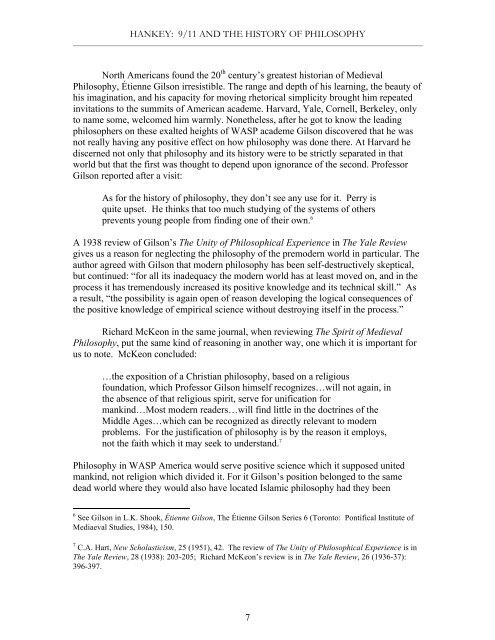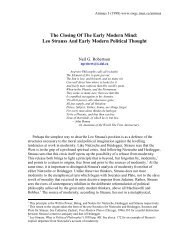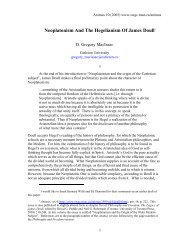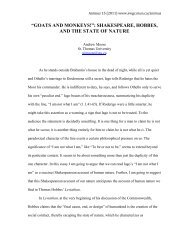Wayne Hankey, 9/11 and the History of Philosophy - Memorial ...
Wayne Hankey, 9/11 and the History of Philosophy - Memorial ...
Wayne Hankey, 9/11 and the History of Philosophy - Memorial ...
Create successful ePaper yourself
Turn your PDF publications into a flip-book with our unique Google optimized e-Paper software.
HANKEY: 9/<strong>11</strong> AND THE HISTORY OF PHILOSOPHYNorth Americans found <strong>the</strong> 20 th century’s greatest historian <strong>of</strong> Medieval<strong>Philosophy</strong>, Étienne Gilson irresistible. The range <strong>and</strong> depth <strong>of</strong> his learning, <strong>the</strong> beauty <strong>of</strong>his imagination, <strong>and</strong> his capacity for moving rhetorical simplicity brought him repeatedinvitations to <strong>the</strong> summits <strong>of</strong> American academe. Harvard, Yale, Cornell, Berkeley, onlyto name some, welcomed him warmly. None<strong>the</strong>less, after he got to know <strong>the</strong> leadingphilosophers on <strong>the</strong>se exalted heights <strong>of</strong> WASP academe Gilson discovered that he wasnot really having any positive effect on how philosophy was done <strong>the</strong>re. At Harvard hediscerned not only that philosophy <strong>and</strong> its history were to be strictly separated in thatworld but that <strong>the</strong> first was thought to depend upon ignorance <strong>of</strong> <strong>the</strong> second. Pr<strong>of</strong>essorGilson reported after a visit:As for <strong>the</strong> history <strong>of</strong> philosophy, <strong>the</strong>y don’t see any use for it. Perry isquite upset. He thinks that too much studying <strong>of</strong> <strong>the</strong> systems <strong>of</strong> o<strong>the</strong>rsprevents young people from finding one <strong>of</strong> <strong>the</strong>ir own. 6A 1938 review <strong>of</strong> Gilson’s The Unity <strong>of</strong> Philosophical Experience in The Yale Reviewgives us a reason for neglecting <strong>the</strong> philosophy <strong>of</strong> <strong>the</strong> premodern world in particular. Theauthor agreed with Gilson that modern philosophy has been self-destructively skeptical,but continued: “for all its inadequacy <strong>the</strong> modern world has at least moved on, <strong>and</strong> in <strong>the</strong>process it has tremendously increased its positive knowledge <strong>and</strong> its technical skill.” Asa result, “<strong>the</strong> possibility is again open <strong>of</strong> reason developing <strong>the</strong> logical consequences <strong>of</strong><strong>the</strong> positive knowledge <strong>of</strong> empirical science without destroying itself in <strong>the</strong> process.”Richard McKeon in <strong>the</strong> same journal, when reviewing The Spirit <strong>of</strong> Medieval<strong>Philosophy</strong>, put <strong>the</strong> same kind <strong>of</strong> reasoning in ano<strong>the</strong>r way, one which it is important forus to note. McKeon concluded:…<strong>the</strong> exposition <strong>of</strong> a Christian philosophy, based on a religiousfoundation, which Pr<strong>of</strong>essor Gilson himself recognizes…will not again, in<strong>the</strong> absence <strong>of</strong> that religious spirit, serve for unification formankind…Most modern readers…will find little in <strong>the</strong> doctrines <strong>of</strong> <strong>the</strong>Middle Ages…which can be recognized as directly relevant to modernproblems. For <strong>the</strong> justification <strong>of</strong> philosophy is by <strong>the</strong> reason it employs,not <strong>the</strong> faith which it may seek to underst<strong>and</strong>. 7<strong>Philosophy</strong> in WASP America would serve positive science which it supposed unitedmankind, not religion which divided it. For it Gilson’s position belonged to <strong>the</strong> samedead world where <strong>the</strong>y would also have located Islamic philosophy had <strong>the</strong>y been6 See Gilson in L.K. Shook, Étienne Gilson, The Étienne Gilson Series 6 (Toronto: Pontifical Institute <strong>of</strong>Mediaeval Studies, 1984), 150.7 C.A. Hart, New Scholasticism, 25 (1951), 42. The review <strong>of</strong> The Unity <strong>of</strong> Philosophical Experience is inThe Yale Review, 28 (1938): 203-205; Richard McKeon’s review is in The Yale Review, 26 (1936-37):396-397.7
















